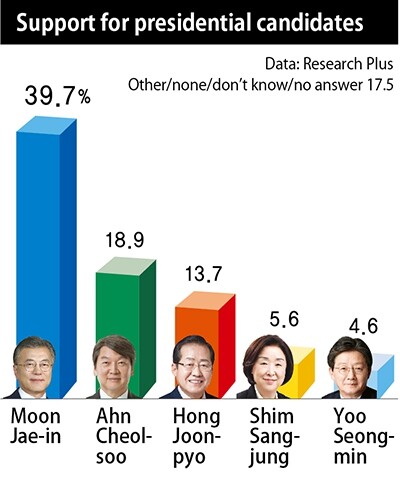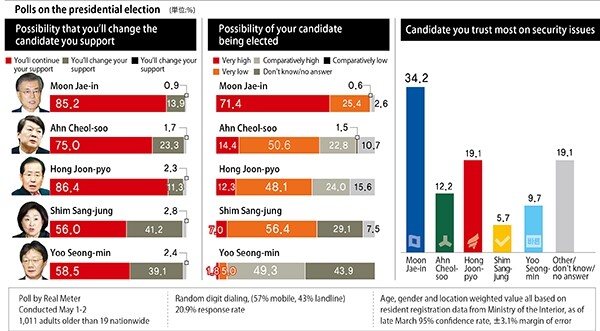hankyoreh
Links to other country sites 다른 나라 사이트 링크
With election next week, voters sorted according to age and ideology

As South Korea enters the final phase of campaigning for the May 9 presidential election, it’s becoming clear that voters are being sorted by age and ideology. Liberal Minjoo Party candidate Moon Jae-in maintains his lead among younger voters in their twenties, thirties and forties and among progressives, while conservative Liberty Korea Party candidate Hong Joon-pyo is making great strides among voters in their sixties and older, among conservatives and in the southeast Busan/Gyeongsang Province region. South Korea’s conservative voters had shifted from former UN Secretary-General Ban Ki-moon to South Chungcheong Province Governor Ahn Hee-jung and then to People’s Party candidate Ahn Cheol-soo, and now they seem to be congregating at their final port of call - Hong Joon-pyo.
In terms of region, Moon has boosted his support everywhere except Busan/Gyeongsang Province. His gains have been particularly noticeable in the southwest Gwangju/Jeolla Province region, where his support rating has jumped 11.6 percentage points (from 41.9% to 53.5%) over the past month. Moon has also been climbing in the polls, though gradually, in Seoul (36% to 41.6%) and in Incheon and Gyeonggi Province (40.1% to 44.5%). In contrast, his support has been declining at a similar rate to the greater Seoul area in Daegu and North Gyeongsang Province (31.6% to 25.2%) and in Busan and South Gyeongsang Province (34.6% to 29.6%).

Ahn has sunk in the polls all over the country, with a particularly severe decline in Daegu and North Gyeongsang Province (41.9% to 15.8%) and in Gwangju/Jeolla Province (45.1% to 23.6%). It appears that his supporters have defected en masse to the conservative candidate, Hong, in Daegu and North Gyeongsang Province, and to Moon, in Gwangju/Jeolla Province region. The rise in Hong’s support has been considerable in Daegu and North Gyeongsang Province (9.2% to 28.4%), considered the heart of South Korean conservativism. He has also gotten a distinct boost in Busan and South Gyeongsang Province (14.3% to 18.8%). While regional loyalty seemed to fade in the first part of the race, with Ahn putting up a good fight in both the Busan/Gyeongsang Province and Gwangju/Jeolla Province regions, those sentiments seem to be making a comeback as the race draws to a close with voters in the Gwangju/Jeolla Province and Busan/Gyeongsang Province consolidating around candidates from the two major parties.
In terms of age groups, Moon has posted small gains in all age groups aside from voters in their thirties and in their sixties and older. Support for Ahn and Hong has shifted in opposite directions: Ahn has lost considerable ground while Hong has gained it across all age groups. The change has been especially dramatic among people in their sixties and above. In this age group, Hong’s support has risen (15.1% to 30.4%) about the same amount as Ahn’s support has fallen (49% to 26.4%).
Looking at ideological leanings, Moon Jae-in has lost some ground among conservatives while gaining some among progressives. Hong has enjoyed a definite gain among conservatives, while Ahn‘s support has plummeted across the entire ideological spectrum. There has also been a clear shift in support among those who voted for Park Geun-hye in the 2012 presidential election. In polls one month ago, 51.9% of such voters said they supported Ahn, but in the recent poll, support for Ahn had dropped by half, to 27.2%. During the same period, Hong’s share of Park voters more than doubled, from 15.4% to 34.9%. Ahn’s share of those who voted for Moon in 2012 dropped by 10.3 points (23.8% to 13.5%). As the diverse voters who composed Ahn’s support base have been sorted by region, age and ideology, Moon seems to have posted a small gain while Hong has made a major leap forward.
At the moment, it seems very likely that these trends will become even stronger during the remaining time before the election because Ahn’s supporters are much less loyal than Moon’s and Hong’s supporters. This is reflected by the percentage of respondents who said they intend to keep supporting their preferred candidate: 85.2% for Moon and 86.4% for Hong, but just 75% for Ahn. When asked about the possibility of their preferred candidate being elected, 71.4% of Moon’s supporters said his election was “very likely,” which was much higher than supporters of Ahn (14.4%) and Hong (12.3%).
By Lee Se-young, staff reporter
Please direct questions or comments to [english@hani.co.kr]

Editorial・opinion
![[Editorial] Does Yoon think the Korean public is wrong? [Editorial] Does Yoon think the Korean public is wrong?](https://flexible.img.hani.co.kr/flexible/normal/500/300/imgdb/original/2024/0417/8517133419684774.jpg) [Editorial] Does Yoon think the Korean public is wrong?
[Editorial] Does Yoon think the Korean public is wrong?![[Editorial] As it bolsters its alliance with US, Japan must be accountable for past [Editorial] As it bolsters its alliance with US, Japan must be accountable for past](https://flexible.img.hani.co.kr/flexible/normal/500/300/imgdb/original/2024/0417/6817133413968321.jpg) [Editorial] As it bolsters its alliance with US, Japan must be accountable for past
[Editorial] As it bolsters its alliance with US, Japan must be accountable for past- [Guest essay] Amending the Constitution is Yoon’s key to leaving office in public’s good graces
- [Editorial] 10 years on, lessons of Sewol tragedy must never be forgotten
- [Column] A death blow to Korea’s prosecutor politics
- [Correspondent’s column] The US and the end of Japanese pacifism
- [Guest essay] How Korea turned its trainee doctors into monsters
- [Guest essay] As someone who helped forge Seoul-Moscow ties, their status today troubles me
- [Editorial] Koreans sent a loud and clear message to Yoon
- [Column] In Korea’s midterm elections, it’s time for accountability
Most viewed articles
- 1[Column] The clock is ticking for Korea’s first lady
- 2Samsung barricades office as unionized workers strike for better conditions
- 3[Editorial] When the choice is kids or career, Korea will never overcome birth rate woes
- 4[News analysis] After elections, prosecutorial reform will likely make legislative agenda
- 5Why Israel isn’t hitting Iran with immediate retaliation
- 6S. Korea, Japan reaffirm commitment to strengthening trilateral ties with US
- 7[Editorial] Does Yoon think the Korean public is wrong?
- 8[Guest essay] How Korea turned its trainee doctors into monsters
- 9[Editorial] 10 years on, lessons of Sewol tragedy must never be forgotten
- 10Strong dollar isn’t all that’s pushing won exchange rate into to 1,400 range